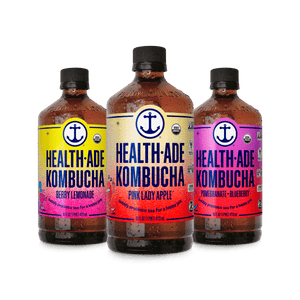
Kombucha | 12 Pack
Fan Favorite Variety Pack
One-time Purchase
49.95

Copied URL to clipboard!
Happy New Year! If you're feeling ready for a fresh start, there's nothing like the beginning of a new year to get you thinking about what feel-good habits and routines you'd like to build in the coming months.
You're not alone if you're coming out of the holiday season feeling tired, run-down, or uncomfortable in your body. This is quite common if you've been out of your routine, traveling more, sleeping less, or attending more social gatherings that revolve around eating and drinking.
I know it can feel tempting to go all in on the “new year, new me” mindset this time of year, but setting a ton of new goals in efforts to overhaul every aspect of your daily routine can be overwhelming and unsustainable. Instead, try to think of 1-2 habits that you'd like to change and be specific in the actions you'll take to shift your behavior.
Participating in Dry January is a great example of one of these specific, actionable goals—especially if you want to improve your mood, energy levels, and take care of your gut health this year. Let's talk a bit more about Dry January and the benefits of swapping out your alcohol for kombucha (and other fun N/A drinks)!
Alcohol can negatively impact the quality of your sleep. Numerous studies have shown that alcohol can momentarily increase sleepiness but can reduce REM sleep and cause frequent sleep disruptions (1). By cutting out or reducing your alcohol intake, you may find that you sleep more soundly and wake up feeling more refreshed.
Alcohol is a depressant that can disrupt the balance of neurotransmitters in your brain. Since it affects the part of your brain that controls inhibition, drinking alcohol may initially help you feel more confident and relaxed. However, those effects are not long-lasting and the chemical changes in your brain can contribute to feelings of anxiety and depression (2). Taking a break from alcohol can help you feel more alert, reduce stress, and stabilize your mood.
Frequent or excessive alcohol consumption can damage every part of your digestive tract (mouth, throat, esophagus, stomach, intestines, liver, pancreas, etc.). Your digestive system doesn't treat alcohol like it does nutrients found in food. When you drink, your body's number one goal is to eliminate that alcohol and its metabolites. This means that alcohol is metabolized ahead of other nutrients and can even inhibit the absorption of vital nutrients like B vitamins and zinc (3).
Alcohol can also promote inflammation in the digestive tract, increased intestinal permeability, and changes in the ratio between beneficial bacteria in the gut and pathogenic bacteria linked to disease (4).
That said, eliminating or cutting back on alcohol can improve your digestion, nutrient absorption, decrease uncomfortable bloating, and help you protect both your internal organs and gut microbiome!
Drinking less alcohol doesn't mean you have to give up fun, satisfying drinks. In fact, it might encourage you to get creative with new ingredients and mocktail combinations! Flavored seltzers, club soda, fruit juice, and kombucha all make great mocktail bases. We've already talked about how cutting down on alcohol can benefit your gut health, but swapping that alcohol for a gut-supporting kombucha mocktail? Double the goodness!
If you're looking for some suggestions to get you started, here are a few of our favorite combinations:
As you can see, the Dry January trend offers a lot of benefits. Whether you're looking to challenge yourself, save money, or adopt new habits that will improve your physical, mental, and gut health, taking a break from alcohol for a month can be a great way to kick off the new year. Cheers to trying new things and taking care of YOU more in 2024!
Sources:
1. https://www.ncbi.nlm.nih.gov/pmc/articles/PMC4666864/
2. https://www.mentalhealth.org.uk/explore-mental-health/a-z-topics/alcohol-and-mental-health
3. https://www.ncbi.nlm.nih.gov/pmc/articles/PMC10096942/
4. https://www.ncbi.nlm.nih.gov/pmc/articles/PMC5513683/